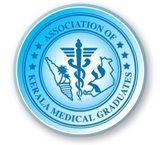
on Friday, April 8
Venue: Sharjah Cultural Palace Auditorium, Quran Roundabout
Time: 8 am Onwards
6 CME Credit Hours, accredited by MOH
Topic: Renal Disease in Clinical Practice
Register Online or Download the Registration
Abstracts of CME Talks on Renal Disease in General Practice
Talk 1: Chronic Kidney Disease: A Global Burden.
 8.00 AM to 8.45 AM
8.00 AM to 8.45 AM
Speaker: Dr.Abraham George, Consultant Nephrologist, Royal Hospital, Sharjah
Chronic Kidney Disease (CKD) has become a global financial burden and in UK it consumes 2% of the NHS budget. The National Service Framework for Chronic Kidney Disease that was published in 2004 by the NHS, UK planned a 10 year vision to set standards and guidelines for these patients.
In this lecture we will be discussing the basics of the kidney function very briefly, how to interpret the creatinine values and thereafter will go on to the various issues or factors related to the chronic kidney disease including Obesity, Diabetes Mellitus, Hypertension and more. It is necessary to understand the staging of CKD because of its practical implications and highlight the importance of proteinuria and CKD in cardiovascular mortality. Current management principles and referral procedures will also be mentioned.
Talk 2: Renal Disease in Pregnancy.
8.45 AM to 9.30 AM
Speaker: Dr.Mustafa Jamal Ahmed, Consultant Nephrologist, Welcare & The City Hospital, Dubai Healthcare City, Dubai
Clinicians encounter many medical problems during pregnancy such as hypertension, proteinuria, pre-eclamptic toxemia (PET) and renal failure. A lot of questions come to your mind like; what medicines are safe in pregnancy for hypertension, when should pregnancy not be advised, when would you consider a therapeutic termination of pregnancy (TOP)?
The lecture will cover a broad range of topics including the physiological changes that occur in the human kidney during normal pregnancy and current principles and management of renal disease including pregnancy in the renal transplant recipient. Over the years, pregnancies have become very successful in patients after kidney transplant with over 95% success rates. Dialysis can reduce the fertility rates, where as in transplant, fertility is normal. We will also be discussing when to refer, when to admit the patients and the specialist management of HELLP syndrome.
Talk 3: Approach to Proteinuria & Hematuria. 
09.30 AM to 10.15 AM
Speaker: Dr.Raman Suresh Babu, Consultant Nephrologist, Al Rahba Hospital, Abudhabi.
Hematuria and Proteinuria are common conditions we find in our practice. The most common causes of hematuria are urinary tract infection, kidney stones or ureter stones, benign prostatic hyperplasia, in older patients. Basically there are two types of hematuria; glomerular and extra glomerular and it is vital to distinguish between them.

Speaker: Dr. Waleed Hassen, Consultant Urologist, Johns Hopkins& Al Tawam Hospital, Al ain

Talk 5: Acute Kidney Injury: An Update.
11.15 AM to 12.00PM
Speaker:Dr. Yassin Ibrahim M. El-Shahat, Consultant Nephrologist, Al Noor Hospital, Abudhabi
Acute renal failure (ARF) or acute kidney injury (AKI), as it is now referred to in the literature, is defined as an abrupt or rapid decline in renal filtration function and it goes way back in the history of medical science to around 2nd century AD.
This condition is usually marked by a rise in serum creatinine concentration or azotemia (a rise in blood urea nitrogen [BUN] concentration). However, immediately after a kidney injury, BUN or creatinine levels may be normal and the only sign of a kidney injury may be decreased urine production. A rise in the creatinine level can result from medications (e.g. cimetidine, trimethoprim) that inhibit the kidney’s tubular secretion. A rise in the BUN level can occur without renal injury, resulting instead from such sources as GI or mucosal bleeding, steroid use, or protein loading, so a careful inventory must be taken before determining if a kidney injury is present.
Prayer & Lunch Break
Talk 6: UTIs in General Practice.
1.45 PM to 2.30 PM
Speaker: Dr. Samir S. Shirodkar, Specialist Urologist, Welcare Hospital, Dubai
Talk 7: Drug Dosing in Renal Disease. 
2.30 PM to 3.15 PM
Speaker: Dr.Sathvik B.Sridhar, Asst.Professor, Dept.of Pharmacy Practice, RAK College of Pharmaceutical Sciences, RAK MHSU, RAK .
Drug dosing is often difficult in patients who do not fit the profile of an average size, average age and otherwise healthy patient and those with decreased renal function are an issue. Inappropriate dosing of drugs can lead to toxicity or ineffective therapy. Decreased renal function can cause decreased clearance of the drug, drug’s metabolites, decreased protein binding of drugs, and decreased ability of the drug to get to the site of action.
Talk 8: Current Concepts in the Prevention & Management of Urolithiasis. 
3.15 PM to 4.00 PM
Speaker: Dr. Nazeer Ahmed, Specialist Urologist, Indian Specialist Medical Centre & Aster Hospital, Dubai.
Urolithiasis is a common problem affecting Middle East and is a disease of affluence with high prevalence that has a large impact on the quality of life of those affected. The presentation deals with how to approach a patient with urolithiasis, to understand the basic pathophysiology and the multifactorial etiology of stone formation. The unique phenotypic variation of each individual stone former and the importance of Randall’s plaque as a precursor lesion of stone are stressed.
Posted by
Dr.Hanish Babu, MD, CME Chair, AKMG Emirates
Acknowledgements
Speakers, Dr.George Jobin Mavely, Dr.Chithra Shamsudheen, Dr.Alex Abraham.




1 comment:
The World Health Day falls on April 7th and this CME on Renal Disease in Clinical Practice on April 8th Friday at Sharjah Cultural Palace will be well attended and this will help,I am sure,to spread vital knowledge to save and protect our Kidneys.
Post a Comment